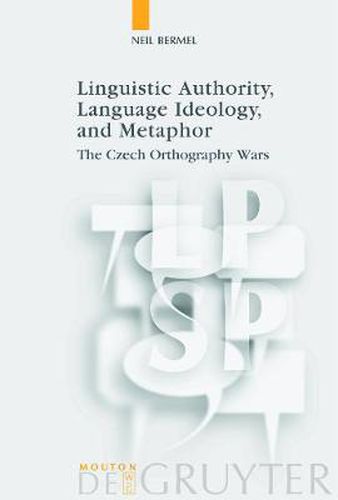Readings Newsletter
Become a Readings Member to make your shopping experience even easier.
Sign in or sign up for free!
You’re not far away from qualifying for FREE standard shipping within Australia
You’ve qualified for FREE standard shipping within Australia
The cart is loading…






This title is printed to order. This book may have been self-published. If so, we cannot guarantee the quality of the content. In the main most books will have gone through the editing process however some may not. We therefore suggest that you be aware of this before ordering this book. If in doubt check either the author or publisher’s details as we are unable to accept any returns unless they are faulty. Please contact us if you have any questions.
How does a country find itself ‘at war’ over spelling? This book focuses on a crucial juncture in the post-communist history of the Czech Republic, when an orthographic commission with a moderate reformist agenda found itself the focus of enormous public controversy.
Delving back into history, Bermel explores the Czech nation’s long tradition of intervention and its association with the purity of the language, and how in the twentieth century an ascendant linguistic school - Prague Functionalism - developed into a progressive but centralizing ideology whose power base was inextricably linked to the communist regime. Bermel looks closely at the reforms of the 1990s and the heated public reaction to them. On the part of language regulators, he examines the ideology that underlay the reforms and the tactics employed on all sides to gain linguistic authority, while in dissecting the public reaction, he looks both at conscious arguments marshaled in favor of and against reform and at the use, conscious and subconscious, of metaphors about language.
Of interest to faculty and students working in the area of language, cultural studies, and history, especially that of transitional and post-communist states, this volume is also relevant for those with a more general interest in language planning and language reform.
The book is awarded with the The George Blazyca Prize in East European Studies 2008 .
$9.00 standard shipping within Australia
FREE standard shipping within Australia for orders over $100.00
Express & International shipping calculated at checkout
This title is printed to order. This book may have been self-published. If so, we cannot guarantee the quality of the content. In the main most books will have gone through the editing process however some may not. We therefore suggest that you be aware of this before ordering this book. If in doubt check either the author or publisher’s details as we are unable to accept any returns unless they are faulty. Please contact us if you have any questions.
How does a country find itself ‘at war’ over spelling? This book focuses on a crucial juncture in the post-communist history of the Czech Republic, when an orthographic commission with a moderate reformist agenda found itself the focus of enormous public controversy.
Delving back into history, Bermel explores the Czech nation’s long tradition of intervention and its association with the purity of the language, and how in the twentieth century an ascendant linguistic school - Prague Functionalism - developed into a progressive but centralizing ideology whose power base was inextricably linked to the communist regime. Bermel looks closely at the reforms of the 1990s and the heated public reaction to them. On the part of language regulators, he examines the ideology that underlay the reforms and the tactics employed on all sides to gain linguistic authority, while in dissecting the public reaction, he looks both at conscious arguments marshaled in favor of and against reform and at the use, conscious and subconscious, of metaphors about language.
Of interest to faculty and students working in the area of language, cultural studies, and history, especially that of transitional and post-communist states, this volume is also relevant for those with a more general interest in language planning and language reform.
The book is awarded with the The George Blazyca Prize in East European Studies 2008 .